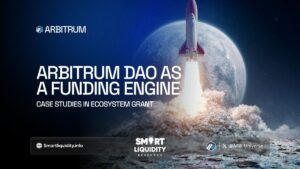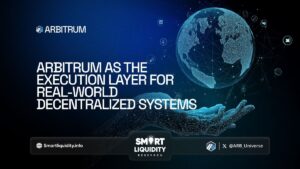Reducing Ethereum’s Energy Consumption and Carbon Footprint with Arbitrum


Reducing Ethereum’s Energy Consumption and Carbon Footprint with Arbitrum! In the ever-evolving world of blockchain technology, Ethereum has consistently stood out as a pioneering platform. However, one of the significant criticisms it faces is its high energy consumption and the resulting carbon footprint.
Enter Arbitrum, a layer 2 scaling solution, which promises to address these environmental concerns while enhancing Ethereum’s performance.
Understanding Ethereum’s Environmental Impact
Ethereum, like many other blockchain networks, relies on a proof-of-work (PoW) consensus mechanism. This process, while secure and decentralized, requires vast amounts of computational power. The miners, who validate transactions and secure the network, use powerful hardware that consumes a lot of electricity. According to some estimates, the energy consumption of the Ethereum network rivals that of small countries, leading to a substantial carbon footprint.
The Promise of Arbitrum
Arbitrum is designed to mitigate these issues by offering a layer 2 solution that significantly reduces the load on the Ethereum mainnet. By processing transactions off-chain and only interacting with the Ethereum mainnet for finality and security, Arbitrum can perform the same tasks with a fraction of the energy.
Key Benefits of Arbitrum
- Scalability
Arbitrum can handle thousands of transactions per second, compared to Ethereum’s current limit of about 15 transactions per second. This scalability reduces the need for excessive computational power, thereby lowering energy consumption. - Cost Efficiency
By moving most of the transaction processing off-chain, Arbitrum reduces the gas fees associated with Ethereum transactions. Lower fees mean more efficient use of resources and less wastage. - Enhanced Security
Despite operating off-chain, Arbitrum maintains the robust security guarantees of the Ethereum mainnet. This ensures that the reduction in energy consumption does not come at the cost of security. - Reduced Carbon Footprint
By lowering the energy required for transaction processing, Arbitrum contributes to a significant reduction in the overall carbon footprint of the Ethereum network. This makes Ethereum more sustainable and environmentally friendly.
The Future of Sustainable Blockchain
The integration of solutions like Arbitrum into the Ethereum ecosystem represents a significant step towards a more sustainable blockchain future. As more users and developers adopt layer 2 solutions, the overall energy consumption and carbon footprint of blockchain networks can be drastically reduced.
In conclusion, Arbitrum offers a promising path forward for Ethereum, balancing the need for scalability and efficiency with environmental responsibility. By reducing energy consumption and carbon emissions, Arbitrum not only enhances Ethereum’s performance but also contributes to the global efforts to combat climate change.
Arbitrum is paving the way for a greener and more efficient blockchain future, proving that technological advancement and environmental sustainability can go hand in hand.




